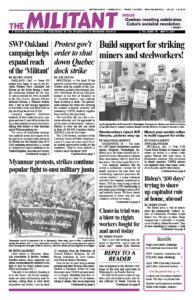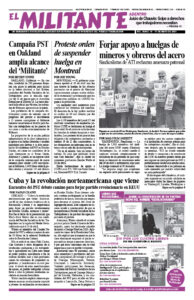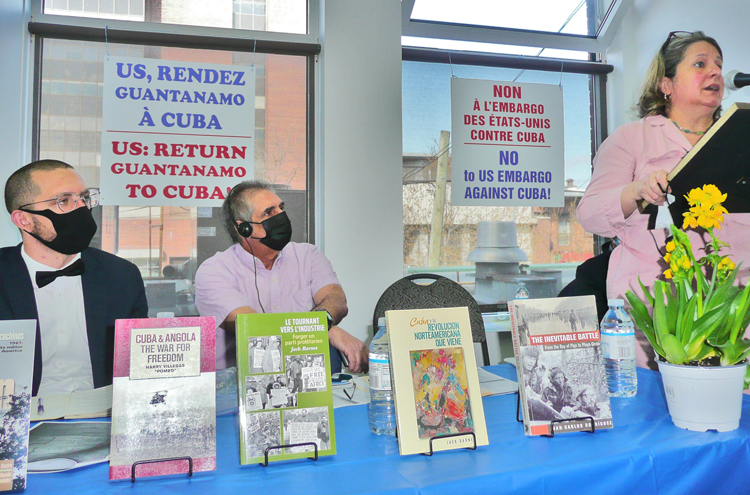MONTREAL — “We’re here to celebrate the 60th anniversary of three historic turning points in the Cuban Revolution,” said Communist League leader Michel Prairie, welcoming some 40 people to an April 17 meeting organized by the Communist League and supported by the Table de concertation et solidarite Quebec-Cuba.
The meeting celebrated the defeat of the invasion of Cuba at Playa Girón by 1,500 U.S.-organized mercenaries in April 1961; the description days before by Fidel Castro of the socialist character of the revolution, affirming what workers and farmers accomplished as they made deep inroads against capitalist property relations; and the success of the campaign to teach hundreds of thousands of peasants how to read and write that same year, carried out by 100,000 young volunteers who went to the countryside to live and work with those they taught.
Through these far-reaching actions workers and farmers transformed themselves, deepening their self-confidence, class consciousness and awareness of the character of their socialist revolution.
Mara Bilbao, Cuban consul general in Montreal, Consul official Eduardo Escandell, and Philippe Tessier, rail worker and Communist League candidate for mayor in the Montreal borough of Ville St-Laurent, spoke.
“This celebration takes place at the time of deepening threats caused by the U.S. blockade of Cuba and the unprecedented health crisis caused by COVID-19,” said Bilbao. “We see the support of the people for the defense and continuity of the Cuban Revolution.”
The 1961 victory of Cuban armed forces and volunteer militias at Playa Girón “was the first major military defeat of U.S. imperialism in Latin America and demonstrated the unconditional support of the Cuban people for their revolution,” Escandell said.
Internationalist mission in Angola
Fourteen years later Cuba sent thousands of volunteers to Angola at the request of its government “to defend the country from the South African invasion,” added Escandell.
In 1983 he volunteered to join that internationalist mission. “Together with the Angolans, my comrades and I shared the meager rations, the long nights of guard duty and the moments of tension in combat,” Escandell said. He returned to Cuba that year to recover from injuries sustained during his duties.
The “Cuban presence was extended for more than 15 years to preserve the integrity and independence of Angola. Throughout that period, not only combatants from Cuba, but tens of thousands of teachers and health and construction workers participated in this epic struggle,” he said.
The victory of the Angolan and Cuban peoples in 1988 “opened the way to the independence of Namibia,” Escandell said. “It was one of the factors, together with the struggle of the South African people,” that accelerated the fall of the apartheid regime.
Cuba, example for working people
The victories celebrated at the meeting are an example to working people in Canada and worldwide, Tessier told the celebration.
“Cuba is the only country today where workers and farmers, led by a proletarian leadership, have taken state power and embarked on the road of liberating themselves.”
Tessier explained how the victories won in Cuba in 1961 helped convince a generation of revolutionary-minded young people in the U.S. and Canada of the need to make socialist revolutions in North America and to build the proletarian parties needed to lead that struggle. He encouraged participants to read Cuba and the Coming American Revolution by Jack Barnes, national secretary of the Socialist Workers Party in the U.S. Barnes went to Cuba in 1960 and describes the impact of the revolution on himself and others.
“It is impossible to build a proletarian party without putting defense of the Cuban Revolution at the center of what we do,” Tessier said.
He urged those present to join monthly car caravans called to demand an end to Washington’s economic war against Cuba and to build solidarity with the strikes by Montreal longshore workers against unsafe work schedules and other labor battles.
“It is through struggles like these that the leadership our class needs can be forged,” Tessier said. Along that road working people can build a movement “to lead a struggle to take political power into our own hands.”
During the discussion Escandell was asked about the impact of the Cuban volunteers’ participation in the Angolan war inside Cuba itself. Over “300,000 Cubans out of a population of 10 million went to Angola,” he said. “The imperialists had to imagine if we fought that hard some 16,000 kilometers away [10,000 miles], how hard we would fight if they invaded Cuba.”
“What message would you send to the people of Africa today?” asked Djondo Koffi, originally from Benin.
“In Angola we saw the real nature of capitalism and it made us that more committed to what the Cuban Revolution was doing,” Escandell replied. “My message is you have to fight, there is no other solution.”


